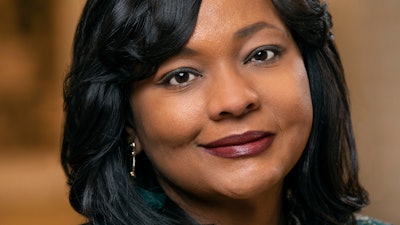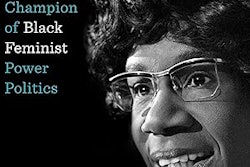I was a young academic when I first heard a colleague quote Audre Lorde: “For the master’s tools will never dismantle the master’s house. They may allow us to temporarily beat him at his own game, but they will never enable us to bring about genuine change.” It resonated immediately in the context in which I heard it — in a gathering of religion scholars of color. The quote lived quietly in my heart for a long time. As I moved from a faculty role into more administrative work, the words stayed with me though they no longer informed text selection, course design, or other personal pedagogical practices.
 Dr. Mary Dana Hinton
Dr. Mary Dana Hinton
I now realize why these words have developed such power over me. Leaders and scholars of color, along with their allies, have sought access to the academy for themselves and for students. We have worked hard to have a seat at the table to inform and shape policies. Many of us have, for decades, sought to make higher education more diverse, accessible, and inclusive. We have questioned and tweaked programs, policies, and practices in an effort to help more students (and faculty and staff) find success and achieve equitable outcomes.
Yet, today, we find the outcomes remain inequitable: fewer students choosing college, no sustained significant growth in women and people of color attaining leadership roles, and ever-widening income gaps within and between our students and institutions. Since we haven’t actually changed the game, we have not changed the outcomes. Has using the master’s tools allowed us to be comfortable with inequitable outcomes?
Too often in higher education, we find ourselves attempting to come up with strategies to help students achieve equitable outcomes (playing the master’s game) when genuine change can only come about if we question the systems that created, defined, and allowed those inequities to exist. The changes we need to make are not solely student-focused nor programmatic. Instead, we must challenge institutional assumptions, missions, and starting premises. It is time to craft our own tools by defining meaningful outcomes and what is incumbent on our institutions to do to achieve success.
Here’s another example: we spend a great deal of time discussing how detrimental silos are, and we frequently — so very frequently — engage in faculty vs. administration turf wars and divisions. We use the master’s tools (maintaining the inequitable status quo), which demand there be only one group at the top. Yet, we don’t acknowledge that the tools are dependent upon a mistrustful, adversarial hierarchy; the tools care only for the master’s comfort and success — the status quo. In reality, we would all better succeed if we trusted and encouraged one another to do our part and work collectively toward sustainable thriving institutions.
Higher education is rife with other examples of this phenomenon. We allow “elite” institutions to define excellence; we support the “screening out” of students in the name of academic rigor; and we presume there is but one way to legitimately make it through college — on a fixed timeline and with a particular experience. We are willing to tweak the application of these things, using the master’s tools, definitions, and proscribed outcomes but a real paradigm shift eludes us.
As a sector, we must recognize that time is variable and provide alternate pathways for traditional and nontraditional learners. We must stop reinforcing the notions of elitism and excellence that were not inclusively developed and to which we have become hostage.
At Hollins, our strategic planning efforts reflect an openness to not only removing silos but dismantling their very purpose. And we have emphasized, in word, deed, and resource allocation, building comprehensive support structures to help students thrive:
· Our Student Success, Well-being and Belonging area brings together and leverages the expertise of key campus services with the charge that student academic success is intimately connected to student well-being. We took the difficult steps of shifting our thinking, physical spaces, and guiding practices to achieve this success.
· Through our Hollins Opportunity for Promise through Education (HOPE) program, we have increased educational access by providing young women locally with a tuition-free experience. We combatted the notion that poverty meant not being academically capable. The students have excelled.
· The Artemis Scholarship Program for Women in STEM will help educate the next generation of diverse, highly skilled leaders in the STEM workforce by covering unmet financial need for high-achieving, academically talented scholars in our region, providing each with a full cost of attendance scholarship to Hollins. This will not only diversify the STEM pipeline, but it will impact how we support students.
Similar initiatives can be replicated at other colleges and universities.
We need to disrupt the premises of elitism, screening out, single trajectory/experience, and timeline. We must discontinue worshipping at the altar of those institutions that have set themselves as standard bearers while, at the same time, refusing to acknowledge the rampant inequity that they perpetuate through exclusion. Perhaps most importantly, we must define what elements of our mission matter most, today, for the students we are entrusted with serving.
The next time you find yourself wondering if a proposed change will work, or even if it really is a change, ponder whose tools you are using and whether it’s time to dismantle the house.
Dr. Mary Dana Hinton is the president of Hollins University in Roanoke, Virginia.



















